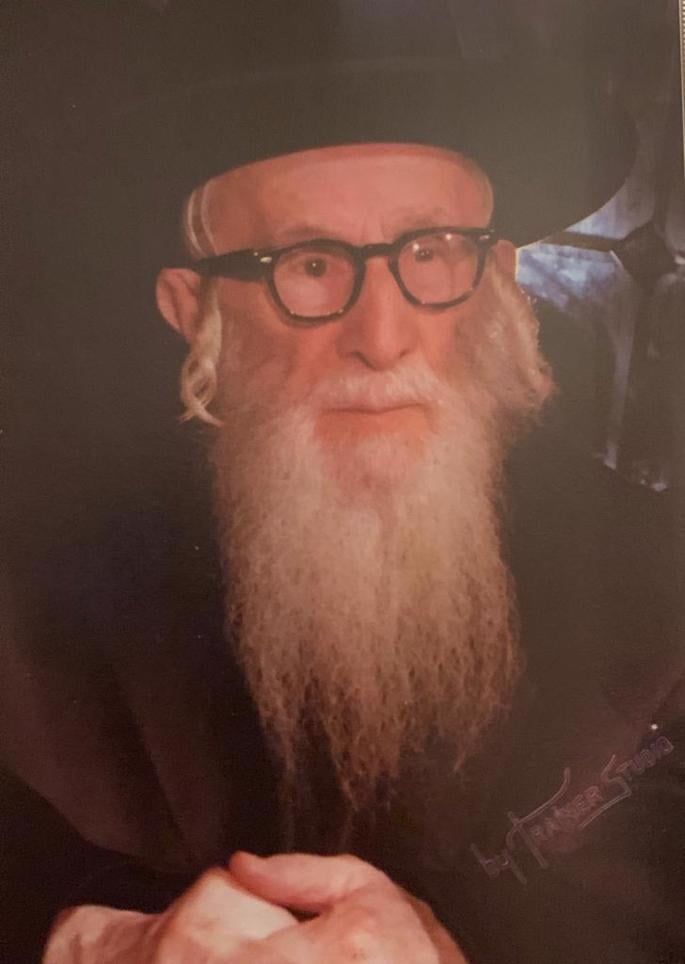In Bergen-Belsen, on the eve of Chanukah, a selection took place. Early in the morning, three German commandants, meticulously dressed in their festive black uniforms and in visibly high spirits, entered the men's barracks. They ordered the men to stand at the foot of their three-tiered bunk beds.
The selection began. No passports were required, no papers were checked, there was no roll call and no headcount. One of the three commandants just lifted the index finger in his snow-white glove and pointed in the direction of a pale face, while his mouth pronounced the death sentence with one single word: "Come!"
Like a barrage of machine-gun fire came the German commands: "Komme, komme, komme, komme, komme." The men selected were marched outside. S.S. men with rubber truncheons and iron prods awaited them. They kicked, beat, and tortured the innocent victims. When the tortured body no longer responded, the revolver was used . . . .
The random selection went on inside the barracks and the brutal massacre continued outside of the barracks until sundown. When the Nazi black angels of death departed, they left behind heaps of hundreds of tortured and twisted bodies.
Then Chanukah came to Bergen-Belsen. It was time to kindle the lights. A jug of oil was not to be found, no candle was in sight, and a hanukkiah belonged to the distant past. Instead, a wooden clog, the shoe of one of the inmates, became a hanukkiah; strings pulled from a concentration-camp uniform, a wick; and the black camp shoe polish, pure oil.
Not far from the heaps of the bodies, the living skeletons assembled to participate in the kindling of Hanukkah lights.
The Rabbi of Bluzhov lit the first light and chanted the first two blessings in his pleasant voice, and the festive melody was filled with sorrow and pain. When he was about to recite the third blessing, he stopped, turned his head, and looked around as if he were searching for something.
But immediately, he turned his face back to the quivering small lights and in a strong, reassuring, comforting voice, chanted the third blessing: "Blessed art Thou, 0 Lord our God, King of the Universe, who has kept us alive, and hast preserved us, and enabled us to reach this season."

Rabbi Israel Spira, Rebbe of Bluzhov (1891-1989).
Among the people present at the kindling of the lights was a Mr. Zamietchkowski, one of the leaden of the Warsaw Bund. He was a clever, sincere person with a passion for discussing matters of religion, faith, and truth. Even here in camp at Bergen Belsen, his passion for discussion did not abate. He never missed an opportunity to engage in such a conversation.
As soon as the Rabbi of Bluzhov had finished the ceremony of kindling the lights, Zamietchkowski elbowed his way to the rabbi and said, "Spira, you are a clever and honest person. I can understand your need to light Hanukkah candles in these wretched times. I can even understand the historical note of the second blessing, 'Who wroughtest miracles for our fathers in days of old, at this season.' But the fact that you recited the third blessing is beyond me. How could you thank God and say 'ברוך אתה השם אלקינו מלך העולם שהחיינו וקיימנו והעגיענו לזמן הזה'? How could you say it when hundreds of dead Jewish bodies are literally lying within the shadows of the Chanukah lights, when thousands of living Jewish skeletons are walking around in camp, and millions more are being massacred? For this you are thankful to God? This you call 'keeping us alive'?"
"Zamietchkowski, you are a hundred percent right," answered the rabbi. "When I reached the third blessing, I also hesitated and asked myself, what should I do with this blessing? I turned my head in order to ask the Rabbi of Zaner and other distinguished rabbis who were standing near me, if indeed I might recite the blessing. But just as I was turning my head, I noticed that behind me a throng was standing, a large crowd of living Jews, their faces expressing faith, devotion, and concentration as they were listening to the rite of the kindling of the Chanukah lights. I said to myself, if God, blessed be He, has such a nation that at times like these, when during the lighting of the Chanukah lights they see in front of them the heaps of bodies of their beloved fathers, brothers, and sons, and death is looking from every corner, if despite all that, they stand in throngs and with devotion listening to the Chanukah blessing 'Who wroughtest miracles for our fathers in days of old, at this season'; if, indeed, I was blessed to see such a people with so much faith and fervor, then I am under a special obligation to recite the third blessing.”
Some years after liberation, the Rabbi of Bluzhov, now residing in Brooklyn, New York, received regards from Mr. Zamietchkowski. Zamietchkowski asked the son of the Skabiner Rabbi to tell Israel Spira, the Rabbi of Bluzhov, that the answer he gave him that dark Chanukah night in Bergen Belsen had stayed with him ever since, and was a constant source of inspiration during hard and troubled times.
Based on a conversation of the Grand Rabbi of Bluzhov, Rabbi Israel Singer, with Aaron Frankel and Baruch Singer, June 22, 1975. I heard it at the rabbi's house.